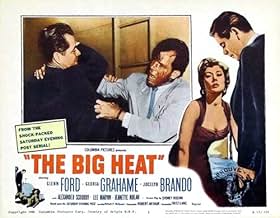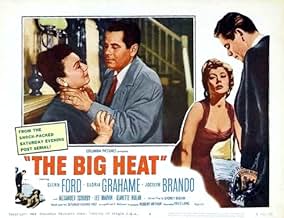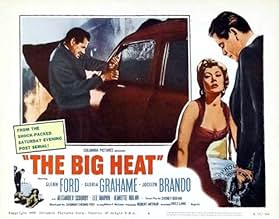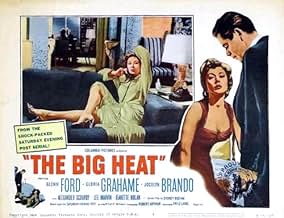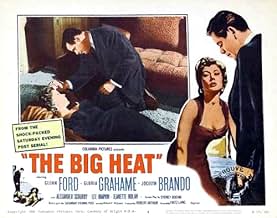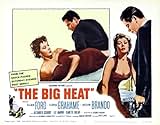Tough cop Dave Bannion takes on a politically powerful crime syndicate.Tough cop Dave Bannion takes on a politically powerful crime syndicate.Tough cop Dave Bannion takes on a politically powerful crime syndicate.
- Awards
- 2 wins & 2 nominations total
- Director
- Writers
- All cast & crew
- Production, box office & more at IMDbPro
Featured reviews
This punchy little noir moves along at brisk clip. Glenn Ford simmers the whole time like a boiling kettle about to blow . This man has no pleasures that are obvious except his Westinghouse wife and child. Lee Marvin barely maintains control for much of the film. He is a catalogue of evil and greedy excess. Gloria Grahame is marvelous, witty, beautiful, bitter beyond hope. There is no redemption to be had for most of the characters in this sordid little universe. Conspiracy theorists of the 21st century will look back at the kind of simple-minded corrupt worldview espoused by Lang in this and other films and lament its loss. In THE BIG HEAT, evil and rot have names and faces and with enough fortitude, and the willingness to lose everything, they can be conquered. At least for a day. We know today that the whole infrastructure of power is poisoned beyond repair. The fifties held out a modicum of hope. Brief, fleeting hope. This is a violent film. Others have commented that much of the horror is committed off screen. But you can easily imagine it. Lang doesn't pull many punches here. The treadmill of denouement speeds up rapidly in the last few sections of the film. After viewing a film like THE BIG HEAT, I often want to wander down some dark street and find a corner diner, something like the one portrayed in Hoppers's NIGHTHAWKS, and have a cup of java, listen to some Brubeck on the jukebox, and wait for someone to come in from the chilly street . But the diners in my neighbourhood are either in the middle of the block or close early because of street crime. So I stay home, have a cup of tea, and dream noirish thoughts half asleep on my couch. This is a fine entry into the film noir lexicon.
Glenn Ford is a police sergeant seeking retribution for the death of his wife in "The Big Heat," a 1953 film that also stars Gloria Graham and Lee Marvin. While investigating a police officer's alleged suicide, Ford's idyllic family life is ruptured when his lovely young wife is killed in a car bombing intended for him. Some have suggested the similar scene in "The Godfather" was inspired by "The Big Heat." It's certainly possible.
For 1953, the violence is uncompromising, particularly against the female character played by Gloria Graham when she crosses her boyfriend, Lee Marvin, in one of his early roles. Marvin is fantastic as a brute, and this characterization must have done a lot to raise his profile in films.
There are some outstanding performances, including that of Jeannette Nolan as the late officer's wife who knows plenty. Glenn Ford, a handsome, solid actor who seems forgotten now, underplays his role but the coldness and rage he feels is evident as he goes from happy family man to angry avenger.
Excellently directed by Fritz Lang, "The Big Heat" packs a wallop.
For 1953, the violence is uncompromising, particularly against the female character played by Gloria Graham when she crosses her boyfriend, Lee Marvin, in one of his early roles. Marvin is fantastic as a brute, and this characterization must have done a lot to raise his profile in films.
There are some outstanding performances, including that of Jeannette Nolan as the late officer's wife who knows plenty. Glenn Ford, a handsome, solid actor who seems forgotten now, underplays his role but the coldness and rage he feels is evident as he goes from happy family man to angry avenger.
Excellently directed by Fritz Lang, "The Big Heat" packs a wallop.
An honest, family man cop with a wife and daughter is put onto the investigation of another cop's suicide. He closes the case as suicide due to ill health. However when a women tells him another story and is promptly killed, Bannion just investigates further to find that powerful criminals and powerful politicians share the same table at dinner. When his family is split in an attack meant for him he loses his job and becomes bitter he starts to become more like his enemies as he pursues them.
This is a hardboiled thriller that would still stand up today as a tough film violence and attitudes that make it feel more modern than it is. The story follows the descent of family man Bannion into violence and bitterness when he not only loses what is important to him, but when he finds that corruption at high levels has fed down into rank and file officers causing him to stand out when he tries to catch a criminal.
The brutality of this film shouldn't be underestimated Fritz Lang is no softy! Here we have women beaten and killed, we have sex crimes, we have a women disfigured by scalding coffee in her face. Of course all these things are unseen but this was the 50's! However it is still powerful and adds to the intensity of the film. The story may well have been done many times now but imagine seeing something like this back then!
The cast are great. Ford descends into bitterness really well and seems at ease as both thug and family man. The female cast are good in different ways but the one that catches the eye is a young Lee Marvin. I suspect Marvin got fame because his coffee attack stuck in people's minds even today he is best know as a tough guy in the movies.
Overall this is well worth hunting out it is still being copied by many video thrillers and it just goes to show that you don't have to show gory or graphic violence on screen to be powerful, gritty or shocking.
This is a hardboiled thriller that would still stand up today as a tough film violence and attitudes that make it feel more modern than it is. The story follows the descent of family man Bannion into violence and bitterness when he not only loses what is important to him, but when he finds that corruption at high levels has fed down into rank and file officers causing him to stand out when he tries to catch a criminal.
The brutality of this film shouldn't be underestimated Fritz Lang is no softy! Here we have women beaten and killed, we have sex crimes, we have a women disfigured by scalding coffee in her face. Of course all these things are unseen but this was the 50's! However it is still powerful and adds to the intensity of the film. The story may well have been done many times now but imagine seeing something like this back then!
The cast are great. Ford descends into bitterness really well and seems at ease as both thug and family man. The female cast are good in different ways but the one that catches the eye is a young Lee Marvin. I suspect Marvin got fame because his coffee attack stuck in people's minds even today he is best know as a tough guy in the movies.
Overall this is well worth hunting out it is still being copied by many video thrillers and it just goes to show that you don't have to show gory or graphic violence on screen to be powerful, gritty or shocking.
Fritz Lang can conjure up a paranoid thriller with the greatest of ease (actually, it's probably a lot of work, but it looks easy, which is a feat unto itself), and The Big Heat provides some of his classic paranoia to the proceedings of a story of a good, hard cop on the trail of a case that's gone way too corrupt. There are simple visual touches, amid what looks like a standard-shot thriller (when compared to, say, M, which is Godly in its vision of the darkness of humanity's layers peeled back). But it's got the kind of grit to it that most likely inspired Dirty Harry, even if, arguably, Glenn Ford isn't quite as great a star as Clint Eastwood. He's got a style to himself, anyway, like someone who is almost TOO good, and knows it, which is why he'll get the job done even if it means some busted knuckles and a few cracked heads. He's a compelling force as Dave Bannion, and he's perfectly cast against a bunch of sinister, slimy characters (save for the women, and even one of them is just rotten).
After a cop seems to have killed himself, the case looks open and shut. But there seems to be more for Bannion, as he didn't seem like a guy, from some accounts, to do himself in. Turns out there's a big cheese named Lagana who wants this put hush-hush like, and pays off the widow to keep a letter he wrote under wraps. But Bannion is suddenly put to the test, if only of himself, when his family is put in danger (with, of course, tragic results). Lang doesn't stop for a detail that isn't worthy of the attention of the narrative, and there's a connection that he makes between the world of the criminal underworld and the law: it's a place where there's some gray, but the black and white aspect rings through due to the situation at hand: corrupt cops, dirty criminals, and only a couple of dames to trust in the mix of it (one of them Debby, played in another great turn by Gloria Grahame, takes a savage incident with a pot of coffee via Lee Marvin's hand to wise up).
It might not have the depth of an M or Scarlett Street, but the Big Heat is about as solid a genre piece as one could ask for, getting more harrowing from the first gun shot of the picture all the way to the final moment when Bannion leaves the office for a hit-and-run case (a cop's work is never finished, one might suggest). It's also got more intelligence for its conventional roots with the little things; for example, there's a point in the movie where something pivotal could've happened with Bannion's daughter and the thugs, but Lang makes a good step to push aside it, keeping the focus squarely on the task at hand instead of sidestepping the climax into cliché. Land understands how, for the sake of a piece of pulp fiction like this, to keep the lines in order, even if it might seem standard for today: keep Bannion's family wholesome, maybe TOO wholesome, with stories of three little kittens, and keep the criminal elements savage, sinister in their grins and suits and violence brimming underneath.
One things for sure, it doesn't get much less thrilling than seeing Ford and Marvin in an unpredictable shoot-out. A+
After a cop seems to have killed himself, the case looks open and shut. But there seems to be more for Bannion, as he didn't seem like a guy, from some accounts, to do himself in. Turns out there's a big cheese named Lagana who wants this put hush-hush like, and pays off the widow to keep a letter he wrote under wraps. But Bannion is suddenly put to the test, if only of himself, when his family is put in danger (with, of course, tragic results). Lang doesn't stop for a detail that isn't worthy of the attention of the narrative, and there's a connection that he makes between the world of the criminal underworld and the law: it's a place where there's some gray, but the black and white aspect rings through due to the situation at hand: corrupt cops, dirty criminals, and only a couple of dames to trust in the mix of it (one of them Debby, played in another great turn by Gloria Grahame, takes a savage incident with a pot of coffee via Lee Marvin's hand to wise up).
It might not have the depth of an M or Scarlett Street, but the Big Heat is about as solid a genre piece as one could ask for, getting more harrowing from the first gun shot of the picture all the way to the final moment when Bannion leaves the office for a hit-and-run case (a cop's work is never finished, one might suggest). It's also got more intelligence for its conventional roots with the little things; for example, there's a point in the movie where something pivotal could've happened with Bannion's daughter and the thugs, but Lang makes a good step to push aside it, keeping the focus squarely on the task at hand instead of sidestepping the climax into cliché. Land understands how, for the sake of a piece of pulp fiction like this, to keep the lines in order, even if it might seem standard for today: keep Bannion's family wholesome, maybe TOO wholesome, with stories of three little kittens, and keep the criminal elements savage, sinister in their grins and suits and violence brimming underneath.
One things for sure, it doesn't get much less thrilling than seeing Ford and Marvin in an unpredictable shoot-out. A+
Effective film noir about a cop fighting the mob as well as his own corrupt superiors as he investigates a murder. Ford has perhaps the best role of his career as the good cop. His scenes with wife Brando are very nicely handled, adding poignancy to the tragedy that would befall the family. There are shades of Dirty Harry as Ford takes matters into his own hands. Marvin and Grahame are also good as a mobster and his moll, respectively. Lang, a master of this sort of film-making, keeps things moving at a snappy pace. Some of the violence is jarring but of course nothing graphic is shown, given the era the movie was made in. After an excellent start, the second half of the film becomes somewhat routine but it still packs a punch.
Did you know
- TriviaColumbia wanted to borrow Marilyn Monroe from 20th Century-Fox to play the role of Debby Marsh, but Fox's asking price was too high. Gloria Grahame was cast instead.
- GoofsThe street address for the junkyard on Bannion's list is "101", yet the number "1024" is seen on a large sign over the yard's shed.
- Quotes
Debby Marsh: [to Bannion] Oh, well, you're about as romantic as a pair of handcuffs.
- ConnectionsFeatured in Mean Streets (1973)
- SoundtracksIt's a Blue World
(uncredited)
Written by Chet Forrest and Bob Wright
Heard instrumentally during one of the scenes at The Retreat
Details
Box office
- Gross worldwide
- $7,083
- Runtime1 hour 29 minutes
- Color
- Aspect ratio
- 1.37 : 1
Contribute to this page
Suggest an edit or add missing content



